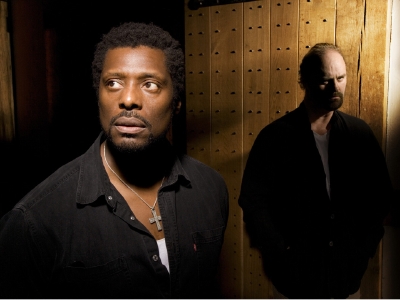Othello at Shakespeare’s Globe
When Desdemona, already sensing that her new husband has been possessed by a quite irrational combo of delusion and jealousy, enquires "why dost thou speak so faintly?" the Globe theatre audience had to agree with her.

Eamonn Walker (best known for the US prison TV series Oz) and an undoubtedly gifted actor, simply struggles to get Othello into gear.
His huge, impressive, frame and athletic prowess, particularly in the closing scene where he shakes his just-strangled wife, Desdemona (Zoe Tapper), is memorable and convincing. This is "close up" stuff.
But, in the first two acts, Walker struggles with his diction and was largely inaudible. This, it has to be said, only makes Tapper (who is excellent) and her fellow actors even more convincing.
Othello, a tragedy which has recently reclaimed its place in any Shakespearian repertoire as hugely important, is, it seems, even more relevant to our complex and shallow age.
Here, raw human emotion always lies beneath whatever veneer of class, riches, status and, today technology, we hope might shield us from the misery and unexplained reactions when love goes wrong. Or when love, at least, seems to go wrong.
The chief cause, Iago (Tim McInnerny), having committed the most serious of atrocities in deluding the Moor into thinking that his beautiful wife has not only slept with inferior officer Cassio, but that she is in love with him, is indeed the strongest force throughout.
This Iago plays the Globe's interactive audience well (a hot, balmy night produced the usual pick and mix audience selection which only adds to a Globe visit. You feel as if you have been to the theatre with people you never met ,but got to know, just for this.)
In Iago's soliloquy, with Othello close by, the green eyed monster which doth mock the meat it feeds on is well and truly focussed.
Sam Crane as Rodorigo (Iago's fool) lifts the mood with a modest campery showing that not all villainy can be taken seriously. The moment he prepares to kill Cassio is highly amusing.
But Lorraine Burroughs deserves special mention for a clever and convincing night as Aemilia – Iago's strong but confused wife (why didn't she guess why he wanted that handkerchief?).
As well as the calamity provoked by jealousy, I couldn't help noticing how shocking domestic violence seems in any age (Iago and Othello in the treatment of their wives) and the rather poignant question of what happens to spouses when their husbands must fight abroad. Desdemona desires to go with her husband.
Walker (as Othello) almost redeems himself in Act V when, dressed in white with his innocent wife, terrible blood is shed as the truth emerges and the levels of deceit spew forth.
His facial expressions and misguided exuberance in producing to slaughter his innocent wife are only diluted by the missed opportunities of Acts I-III. You willed him then to get into the part more, to sing the wonderful verse, to relish the grandeur and tragedy of this most powerful of men.
Then suddenly, as you leave the Globe and spill out onto the banks of the Thames you are nonetheless mainly reassured the wider, bigger picture. The production ultimately redeems itself.
Iago is the epitome of human evil. You are grateful for the undoubted excellence of the two central women actors. But you cannot help but wonder how such a gallant and towering Othello really could have been this quiet, this unsure.
Comments
Share
The SE1 website is supported by people like you
Follow us
Email newsletter
For the latest local news and events direct to your inbox every Monday, you need our weekly email newsletter SE1 Direct.

